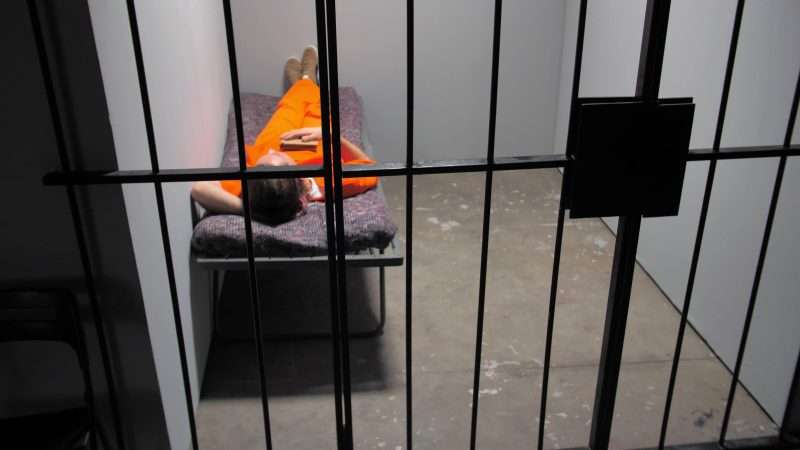
The Iowa Supreme Court is being asked to consider, again, if state courts can bill poor defendants for their court-appointed lawyers, even when they're acquitted or the charges against them are dropped.
If the court takes up the case, State of Iowa v. Ronald Pagliai, it will be the second time in recent years that Iowa's highest court has ruled on the state's unusually aggressive practice of billing poor defendants for court-appointed attorneys. Several civil liberties groups—the Fines and Fees Justice Center (FFJC), the American Civil Liberties Union (ACLU) of Iowa, and Public Justice—filed an amicus brief in that case earlier this month, arguing that the state's fee scheme is unconstitutionally vague and violates the presumption of innocence by levying sanctions against nonconvicted defendants.
"Courts cannot uphold a fair justice system if they are funding it on the backs of the most vulnerable people that come before them," Lisa Foster, co-executive director of the FFJC, said in a press release. "To further extend this miscarriage of justice by enforcing it even when the case is dismissed sends a clear message that puts profit over people."
Everyone knows the part of the Miranda rights spiel about having the right to an attorney, but fewer know that a constitutionally guaranteed lawyer isn't necessarily free.
According to a 2022 report by the National Legal Aid and Defender Association (NLADA), 42 states and the District of Columbia allow courts to charge fees for public defender systems. However, civil liberties groups and news investigations say Iowa is extreme in terms of the amount of fees and the fact that it bills defendants whose charges were thrown out.
In February, The Marshall Project, a nonprofit news outlet covering the criminal justice system, reported on how the Iowa court system saddled indigent defendants with debts for their court-appointed attorneys, even in cases where they were acquitted.
In 2015, Lori Mathes, one of the main subjects of The Marshall Project's story, was charged with a felony drug offense after police found two grams of marijuana in her home. Unable to afford a lawyer, she received court-appointed counsel. Prosecutors struck a deal with Mathes two years later to dismiss her case in exchange for her agreeing to pay court fines and fees. Mathes was shocked to receive a bill for $3,000 in Indigent Defense Fee Recoupment (IDFR) costs.
Mathes appealed her charges up to the Iowa Supreme Court, which in 2020 issued a split 3-3 ruling, leaving intact the lower court rulings upholding her charges.
In State of Iowa v. Ronald Pagliai, Pagliai was assessed $489 in IDFR costs for two charges related to alleged shoplifting, even though the charges were dismissed.
The Marshall Project's analysis of Iowa court data found that between 2012 and 2022, the state sent bills totaling $30 million to indigent defendants who were acquitted or whose charges were dropped.
Iowa does not require courts to consider whether defendants can afford IDFR costs, which by definition they are unlikely to. As a result, the system not only saddles poor defendants with debts, but the state rarely collects on those debts, either. The NLADA report found that "in recent years, no more than 3.2 percent of assessed cost of counsel fees have been collected annually."
Nevertheless, the system has its defenders.
"I think the purpose of that is simply to kind of hold them accountable a little bit," Iowa state Rep. Brian Lohse, a Republican who chairs the Justice System Appropriations Subcommittee told The Marshall Project. "So they just don't see it as a kind of gift."
The Sixth Amendment guarantees criminal defendants the right to counsel under the landmark 1963 Supreme Court case Gideon v. Wainwright. It is as much a "gift" as the First Amendment right to criticize the government without facing retaliation.
However, public defender systems across the country are underfunded and overworked, and in many cases simply don't have the resources to give their clients competent representation.
Rita Bettis Austen, legal director of the ACLU of Iowa, said in a press release that it's "fundamentally unfair to charge anyone exercising their constitutional right to free counsel."
"By definition, these are circumstances where the state has already determined someone is indigent and cannot afford to hire their own lawyer," Austen continued. "It's even worse when the state charges someone for these costs when the charges are ultimately dismissed. Everyone is innocent until proven guilty under the law."
The Iowa Supreme Court will now decide whether to retain the case or send it to a lower appeals court.
The post Iowa Supreme Court is Considering if the State Can Charge Acquitted Defendants for Court-Appointed Attorneys appeared first on Reason.com.







